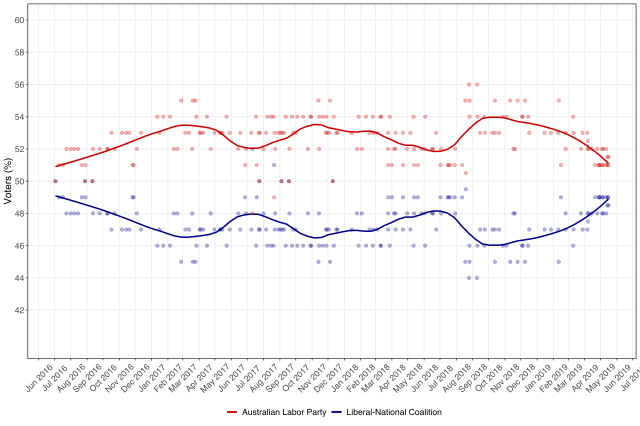That’s not the question talking heads are asking; they are busy thinking about the whys and hows of the election results. Deep thoughts.
However, they should stop and ask themselves precisely that question. More precisely, how come Newspoll, YouGov/Galaxy, Ipsos, Essential, and Roy Morgan, all trusted opinion pollsters, could miss so badly the result of the 2019 election?
 |
| Aggregate of two-party-preferred election polling for the 2019 Australian federal election. [A] |
I haven’t kept a record, but from memory, since last January at least, everybody had been giving Labor 51%-53% of the two-party-preferred voting intention, leaving the COALition with the remaining 49%-47%. According to this list, by Wikipedia -- that most trustworthy source of information -- that makes over 30 opinion polls. The chart above tells pretty much the same story, starting even earlier.
 |
| (Screen capture taken at 14:38 AEST, source) |
Why? Prof. Brian Schmidt (vice-chancellor of the Australian National University and a real Nobel Laureate in physics, unlike the fake-Nobel Laureates in economics) and Paige Cockburn and Bellinda Kontominas explain. In a nutshell: pollsters used to employ the White Pages (remember them?) to draw their random samples of interview subjects. White Pages are no more. Random samples suffer. Results are biased.
We don’t know when those problems started, but my guess is that this isn’t something new and that things were probably getting gradually worse and worse.
----------
I’ll show you why pundits should stop and think. Read the headline below, from a comment by Katharine Murphy:
 |
| (source) |
The elections were “unlosable” for Labor, Murphy says. Well, how does she know that? Duh! Because the polls were saying that Labor had already won.
See what I mean?
The point is that those polls proved themselves unreliable now, but there’s plenty reason to suspect they had been unreliable for a while without us knowing. We don’t know when that began. It’s quite possible that a good random sample would have shown Labor was marching to oblivion in, say, December. Maybe the Labor voting preferences fell on these elections, but on the basis of the poll data, it is equally possible they rose or that they didn’t change.
The same with Bill Shorten’s alleged unpopularity. How do we know he was unpopular? You guessed it: because unanimously unreliable polls have been consistently telling us that.
And spare a thought for Malcolm Turnbull, who was kicked out of the COALition because … the polls said with him at the helm the COALition was doomed, doomed I tells ya.
----------
But there’s more. The icing on the cake is that, according to exit polls (including one by YouGov/Galaxy) conducted in separate voting booths as the voting was conducted, the pre-election polls results were accurate:
Labor in box seat for victory as Liberal vote falls, exit poll shows
By Shane Wright, May 18, 2019 — 5.22PM
Federal Election 2019: Exit polls point to a Labor victory over the Coalition
By Paul Osborne, AAP. May 18, 2019 6:35PM
I think some explaining is in order. If I were a Labor bigwig I would consider recounts. You know, just in case.
UPDATE:
Peter Lewis, an executive director at progressive pollster Essential admits that mistakes were made, but suggests that only their last poll was unreliable:
As pollsters, we are rightly in the firing line after the Australian election. What happened?
The fact that our predictions didn’t match the result challenges us to be more critical about the information we collectBy Peter Lewis. May 21, 2019 14.59 AEST
A different take:
 |
| (source) |
Image Credits:
[A] "Aggregate of two-party-preferred election polling for the next Australian federal election". Author: Canley. Source: Wikimedia. File licensed under the Creative Commons Attribution-Share Alike 4.0 International license. My usage of the file in no way suggests the licensor endorses me or said usage.
No comments:
Post a Comment